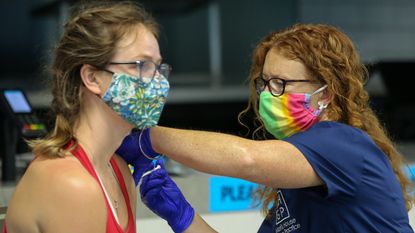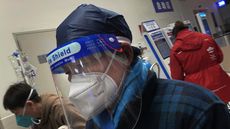Everything you need to know about Covid booster vaccines
Boris Johnson calls for more people to get third jab after string of record-breaking days

The autumn Covid booster rollout in the UK has begun with care home residents, staff and people that are housebound starting to receive their jabs this week.
Most people in these groups will be offered the new bivalent vaccine which protects against both the original strain of the virus and the Omicron variant, said Sky News.
“What this bivalent vaccine gives us is a sharpened tool in our armoury to help protect us against this disease as the virus continues to evolve,” said the Medicines and Healthcare products Regulatory Agency’s chief executive Dr June Raine, after Britain became the first country in the world to approve the “bivalent” jab.
Subscribe to The Week
Escape your echo chamber. Get the facts behind the news, plus analysis from multiple perspectives.

Sign up for The Week's Free Newsletters
From our morning news briefing to a weekly Good News Newsletter, get the best of The Week delivered directly to your inbox.
From our morning news briefing to a weekly Good News Newsletter, get the best of The Week delivered directly to your inbox.
However St John Ambulance has warned of a vaccine volunteer shortage as the new rollout begins, reported The Telegraph. The charity said it is now “urgently” seeking 5,000 volunteers to support the NHS rollout “from the goodness of their hearts”.
The news comes as China and India this week announced they have approved the world’s first inhaled Covid vaccines.
The Chinese vaccine maker, CanSino, said in a statement that their version, which has similar ingredients to its injected vaccine, can be inhaled as a fine mist and provides good protection after just one dose.
Bharat Biotech’s nasal version meanwhile, was authorised by Indian regulators this week, although CBS News said that “it's not clear how well the nasal version works”.
Sign up for Today's Best Articles in your inbox
A free daily email with the biggest news stories of the day – and the best features from TheWeek.com
Teams in the UK and the US have also been investigating nasal spray vaccines for some time. “Scientists say these may give added immunity in the lining of the nose and upper airways, where Covid typically enters the body,” the BBC said.
Who is being offered boosters and when?
“It is important that everyone who is eligible takes up a booster this autumn, whichever vaccine is on offer,” said Professor Wei Shen Lim, chair of the Joint Committee on Vaccination and Immunisation (JCVI), after Moderna’s bivalent shot was approved for UK adults.
The committee – which advises governments in England, Wales, Northern Ireland and Scotland – has confirmed that some form of booster should be offered this autumn to health and social care staff; carers aged over 16; people aged over five whose health puts them at greater risk, including pregnant women; people aged over five who share a house with someone with a weakened immune system; and everyone aged 50 or over.
Originally, “those aged 50-65 were not going to be jabbed”, said the BBC’s health correspondent James Gallagher. But the campaign has been expanded “because of the rapid spread of variants, uncertainty about how the virus will mutate and the expectation that we will are likely to be more social – and therefore give the virus a helping hand this winter – including at Christmas”.
Most people under 50 will not be boosted in the coming months, however. The focus remains on preventing those most at risk from becoming seriously ill, rather than stopping the young from passing the virus on to older people.
Which jabs will be used?
Covid vaccine recipients got the same jab – either Oxford-AstraZeneca, Pfizer or Moderna – for their first two doses.
The Oxford-AstraZeneca jab was the most-used vaccine during this initial phase. But “its use is now being scaled back”, the i news site reported in December, after the Joint Committee on Vaccination and Immunisation recommended a “mix-and-match” approach to spring’s booster rollout.
The advice followed research findings that suggested mRNA vaccines, such as Pfizer or Moderna, “do a better job” as boosters than viral vector vaccines such as the, still “very effective”, AstraZeneca jab, said the news site.
The vaccines recommended for use in the upcoming autumn booster programme for adults aged 18 years and over are:
- Moderna mRNA (Spikevax) bivalent Omicron BA.1/Original ‘wild-type’ vaccine
- Moderna mRNA (Spikevax) Original ‘wild-type’ vaccine
- Pfizer-BioNTech mRNA (Comirnaty) Original ‘wild-type’ vaccine
- in exceptional circumstances, the Novavax Matrix-M adjuvanted wild-type vaccine (Nuvaxovid) may be used when no alternative clinically suitable UK-approved Covid-19 vaccine is available
For people aged 12 to 17 years:
- Pfizer-BioNTech mRNA (Comirnaty) Original ‘wild-type’ vaccine
For people aged 5 to 11 years:
- Pfizer-BioNTech mRNA (Comirnaty) Original ‘wild-type’ vaccine paediatric formulation
Of these vaccines, only Moderna's new bivalent version has been designed specifically to target both the original Covid-19 strain and the Omicron variant, which arrived in the UK last winter.
How does the new bivalent vaccine compare with rival jabs?
According to US pharma giant Moderna, trials on a sample group of 437 people found that the new vaccine was safe and gave better immune protection against newer variants than other Covid jabs.
Levels of antibodies capable of sticking to and disabling the original Omicron variant (BA.1) were 1.7 times higher in people given the new vaccine. They were also found to have higher levels of protection against more recent Omicron variants (BA.4 and BA.5), now the dominant strains in the UK.
The Joint Committee on Vaccination and Immunisation said that the bivalent vaccine produced “a marginally higher immune response” against some variants than the original Moderna jab, but added that the “clinical relevance of these small differences is uncertain” .
All of the available boosters “provide good protection against severe illness from Covid-19,” added the committee, which emphasised that “getting a booster in good time before the winter season is more important for those eligible than the type of vaccine that is received”.
The committee had previously advised that mRNA jabs provided a particularly “strong booster effect”. A study published in The Lancet last December found that the original Moderna vaccine produced the biggest antibody response as a booster jab after initial doses of AstraZeneca or Pfizer.
A total of six different vaccines – AstraZeneca, Curevac, Johnson & Johnson (Janssen), Moderna, Novavax, Pfizer and Valneva – were found to be “safe and effective” as top-up jabs, although “the antibody boost they provide varies substantially”, reported the BMJ.
Covid vaccines remain one of the most effective ways of reducing the spread and severity of the disease. Research published in The Lancet in June found that the vaccines prevented an estimated 20m deaths in their first year of use.
Create an account with the same email registered to your subscription to unlock access.
-
 5 high-caliber cartoons about Kristi Noem shooting her puppy
5 high-caliber cartoons about Kristi Noem shooting her puppyCartoons Artists take on the rainbow bridge, a farm upstate, and more
By The Week US Published
-
 The Week Unwrapped: Why is the world running low on blood?
The Week Unwrapped: Why is the world running low on blood?Podcast Scientists believe universal donor blood is within reach – plus, the row over an immersive D-Day simulation, and an Ozempic faux pas
By The Week Staff Published
-
 Rishi Sunak's asylum spat with Ireland explained
Rishi Sunak's asylum spat with Ireland explainedIn Depth Irish government plans to override court ruling that the UK is unsafe for asylum seekers
By The Week UK Published
-
 Covid four years on: have we got over the pandemic?
Covid four years on: have we got over the pandemic?Today's Big Question Brits suffering from both lockdown nostalgia and collective trauma that refuses to go away
By Chas Newkey-Burden, The Week UK Published
-
 The hollow classroom
The hollow classroomOpinion Remote school let kids down. It will take much more than extra tutoring for kids to recover.
By Mark Gimein Published
-
 Excess screen time is making children only see what is in front of them
Excess screen time is making children only see what is in front of themUnder the radar The future is looking blurry. And very nearsighted.
By Devika Rao, The Week US Published
-
 Covid-19: what to know about UK's new Juno and Pirola variants
Covid-19: what to know about UK's new Juno and Pirola variantsin depth Rapidly spreading new JN.1 strain is 'yet another reminder that the pandemic is far from over'
By Arion McNicoll, The Week UK Published
-
 Long-term respiratory illness is here to stay
Long-term respiratory illness is here to stayThe Explainer Covid is not the only disease with a long version
By Devika Rao, The Week US Published
-
 Covid inquiry: the most important questions for Boris Johnson
Covid inquiry: the most important questions for Boris JohnsonTalking Point Former PM has faced weeks of heavy criticism from former colleagues at the public hearing
By The Week Staff Published
-
 China's pneumonia cases: should we be worried?
China's pneumonia cases: should we be worried?The Explainer Experts warn against pushing 'pandemic panic button' following outbreak of respiratory illness
By Keumars Afifi-Sabet, The Week UK Published
-
 Vallance diaries: Boris Johnson 'bamboozled' by Covid science
Vallance diaries: Boris Johnson 'bamboozled' by Covid scienceSpeed Read Then PM struggled to get his head around key terms and stats, chief scientific advisor claims
By The Week UK Published